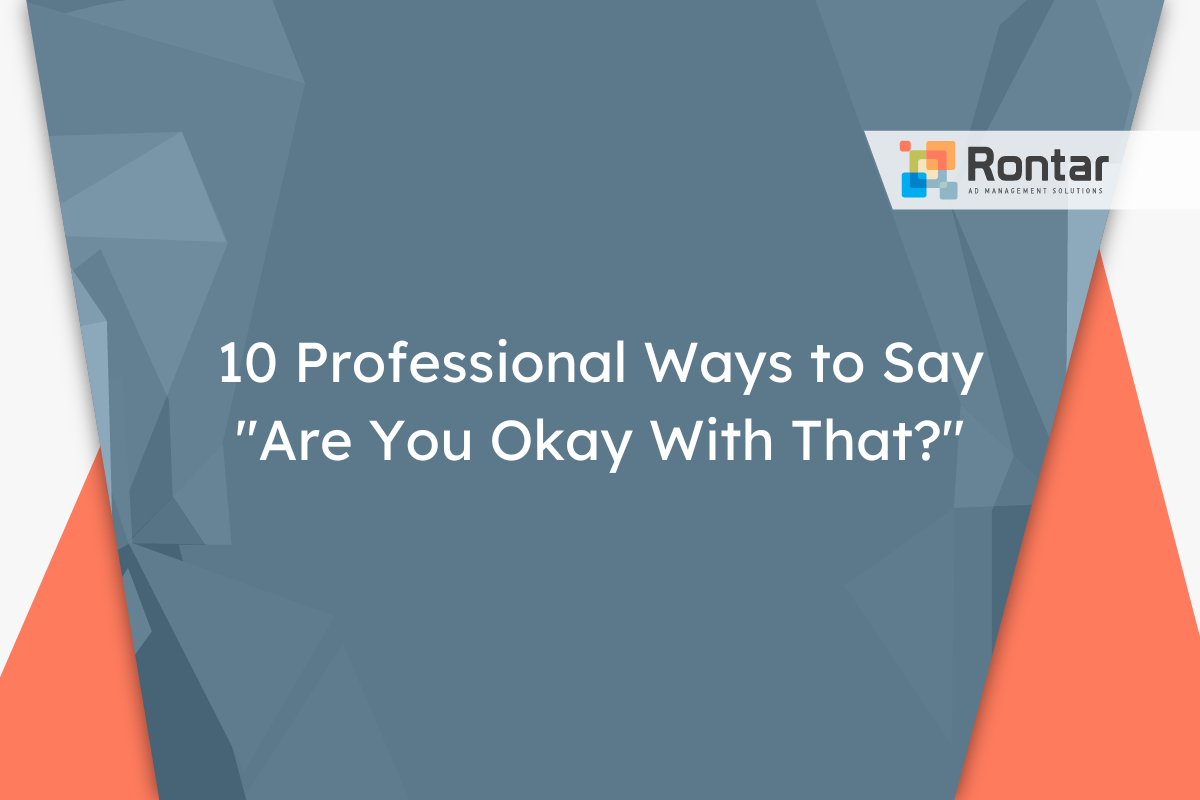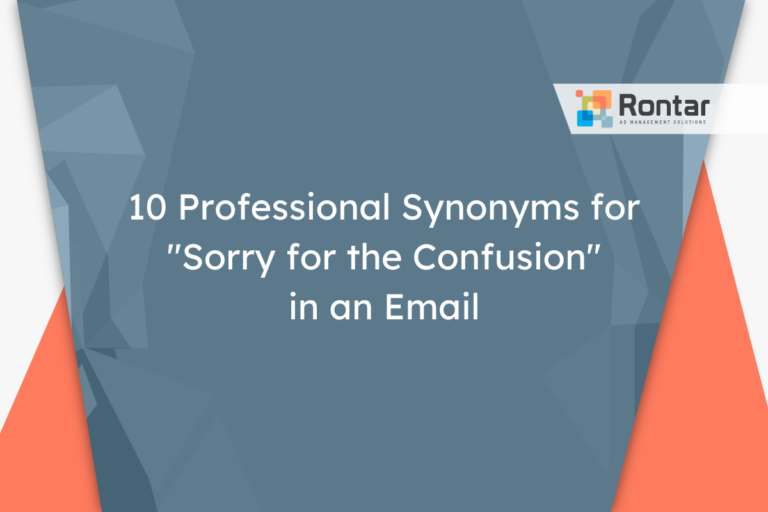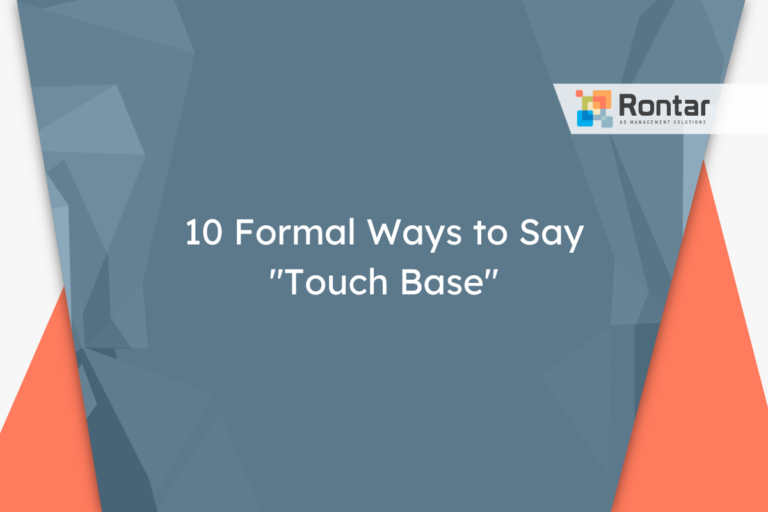10 Professional Ways to Say “Are You Okay With That?”

Sometimes we need to check if others are on board with our ideas or plans. Instead of always using the phrase “Are you okay with that?”, it’s useful to have alternatives.
This article lists 10 different ways you can ask someone for their agreement or approval in a professional environment.
Is It Professional to Say “Are You Okay With That?”
The phrase “Are you okay with that?” can indeed be considered professional, formal or informal, and polite, depending on the context in which it’s used. In professional settings, using “Are you okay with that?” is most suitable in scenarios where there’s a mutual respect or an existing rapport between colleagues.
It’s well-fitted for emails, meetings, or direct conversations, especially when discussing tasks, changes, or proposals. It is perfect for internal communication rather than external or client-facing interactions.
Email example:
Greetings Mark,
I've reviewed the project timeline and suggest moving our deadline up by two weeks to accommodate the feedback loop. This adjustment should give us ample time to refine our final submission.
Are you okay with that? Please share your thoughts.
Best,
Emily
Pros:
- Shows consideration for the recipient’s approval or comfort level.
- Encourages open communication and feedback.
- Appears friendly and approachable in a professional setting.
Cons:
- May be perceived as too informal in certain professional settings.
- Could be viewed as lacking in authority or decisiveness.
- Not suitable for all types of correspondence, particularly with external parties or higher management.
While “Are you okay with that?” is generally acceptable, one might seek alternatives to tailor their message more closely to the expected formality level of the communication or to adjust the tone.
10 Other Ways to Say “Are You Okay With That?”
When communicating in a professional setting, it’s useful to have synonyms for common phrases. Here are 10 professional alternatives to “Are You Okay With That?”
- Does that work for you?
- Is this agreeable to you?
- Are you comfortable with this plan?
- Do you have any concerns with this approach?
- Can we proceed on this basis?
- Is this acceptable to you?
- Would you be alright with this?
- Is this arrangement suitable for you?
- Can you accommodate this request?
- Do you approve of this?
1. Does that work for you?
This alternative is both professional and polite, offering a slightly more casual tone while still maintaining formality. It’s a good synonym for “Are You Okay With That?” as it directly inquires about the recipient’s opinion without being too direct.
This phrase is well-suited for emails or verbal communication where there’s a need for consensus or agreement. It fits best in scenarios where you are proposing a plan or schedule and want to ensure it aligns with everyone involved, particularly with colleagues or team members.
Example:
Greetings Lisa, Following our discussion, we're planning to initiate the project next Monday. Does that work for you? Kind regards, Tom
2. Is this agreeable to you?
This phrase is a bit more formal than the original, making it a great alternative for written communications where a higher level of professionalism is needed. It directly asks for the recipient’s consent, implying a respect for their opinion.
Use this in formal email communications, especially when you’re not very familiar with the recipient. It’s particularly useful in situations involving approvals or confirmations from clients or higher management.
Example:
Hello Daniel, We propose rescheduling our meeting to the 15th. Is this agreeable to you? Best, Claire
3. Are you comfortable with this plan?
This alternative is both professional and informal, striking a balance between being courteous and direct. It asks specifically about the recipient’s comfort level, showing consideration for their preferences.
This phrasing is great for discussing plans or strategies with team members or clients with whom you’ve established a degree of familiarity. It’s suitable for emails or direct conversations where the proposed plan’s impact is significant.
Example:
Dear Alex, We're considering a new approach to the marketing strategy. Are you comfortable with this plan? Regards, Jordan
4. Do you have any concerns with this approach?
This phrase leans towards being more formal and is exceptionally polite, as it not only asks for approval but actively invites feedback or objections. This makes it an excellent synonym for ensuring all viewpoints are considered.
It’s suitable for use in team meetings, emails, or project discussions, especially in collaborative environments where input from various stakeholders is crucial for success. It’s an effective way to gauge resistance or support without imposing.
Example:
Hello Morgan, Before finalizing, we want to review the proposed system upgrades with you. Do you have any concerns with this approach? Sincerely, Elena
5. Can we proceed on this basis?
This alternative is straightforward and professional, suitable for when you’re near the end of a negotiation or discussion and ready to move forward. It’s a direct way to seek closure on a matter, ensuring all parties are on the same page.
Especially practical in emails or meetings where decisions need to be formalized. This approach works well with colleagues, managers, and clients alike, particularly in the context of projects or agreements nearing completion.
Example:
Dear Kevin, Given the adjustments we've agreed upon, can we proceed on this basis? Warm regards, Sophia
6. Is this acceptable to you?
This phrase is professional and to the point. It’s slightly more formal than the original, making it a good synonym for written or verbal communication where direct consent is sought.
It’s best used in emails or direct communication when you need a clear confirmation from the other party, such as in project planning, scheduling, or confirming details with clients or stakeholders.
Example:
Hi Ellen, We've updated the contract based on your feedback. Is this acceptable to you? Best wishes, Nate
7. Would you be alright with this?
This alternative offers a more informal and polite way to ask for approval. It’s a synonym that sounds friendlier while still retaining a professional tone, making it suitable for less formal professional situations.
This phrasing is effective in communications with colleagues or within teams where there is a more relaxed atmosphere. It’s also useful when introducing changes or new ideas and you want to gently gauge reactions before proceeding.
Example:
Hey Sarah, We're thinking of shifting the weekly meeting to Thursdays. Would you be alright with this? Cheers, Luke
8. Is this arrangement suitable for you?
This phrase is somewhat more formal and provides a professional way to inquire about the recipient’s compatibility with a proposed arrangement. It’s a polite request for confirmation that considers the recipient’s convenience.
It’s especially appropriate for use in emails or communications involving logistical arrangements, like meeting times or work schedules, particularly with colleagues or external partners where a degree of formality is required.
Example:
Dear Julia, To accommodate the project timeline, we're adjusting our meeting to early mornings. Is this arrangement suitable for you? Kind regards, Mark
9. Can you accommodate this request?
This alternative is formal and direct, making it a strong synonym for seeking agreement or approval in professional settings. It distinctly shifts the focus to the recipient’s ability to comply or adjust, which can be especially useful in service-oriented or hierarchical relationships.
It is better suited for situations where you’re asking for a favor or for flexibility, whether in emails or direct communications, particularly with service providers or when you are in a position of asking for a concession from colleagues or superiors.
Example:
Dear Grant, Due to unforeseen circumstances, we need to push our meeting ahead by two hours. Can you accommodate this request? Thank you, Rebecca
10. Do you approve of this?
This alternative is very formal and professional, making it an impeccable synonym for signaling that the recipient’s approval is the final step before an action can be taken. It implies a degree of authority on the part of the recipient.
This is particularly effective in professional emails or discussions where formal approvals are required, such as project sign-offs, changes in policy, or significant business decisions. It’s best used with superiors, clients, or stakeholders.
Example:
Dear Mr. Peterson, We have completed the revisions you requested on the project plan. Do you approve of this? Respectfully, Diane
Final Thoughts
Choosing the right words in the workplace can influence how your messages are received. The 10 alternatives to “Are you okay with that?” provided in this article can help make your emails and conversations more professional, formal, or polite, depending on the situation. Each alternative serves a different purpose and can be better suited for specific types of communications or recipients.






